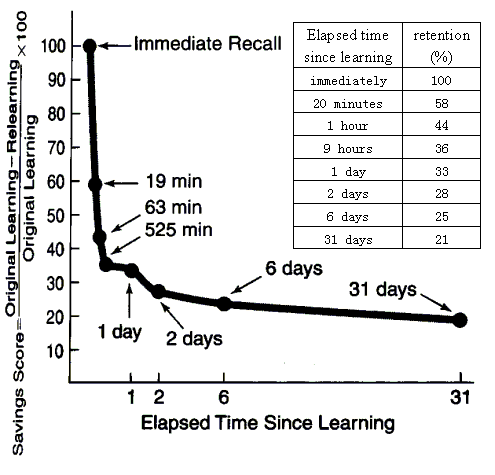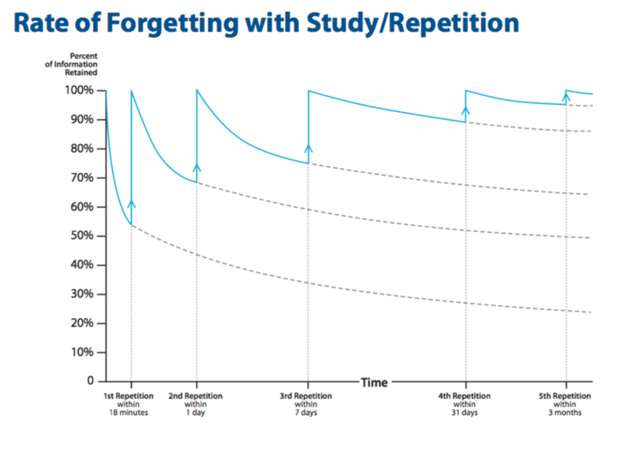How do I actually remember the stuff I learn? How do I memorize my notes, my textbook, and everything covered in class? How much studying do I actually have to do?
Or rather, “How can I spend less time studying while still getting good grades?”
Most students find themselves wondering about these questions. To find the answer, we need to understand our memory and how it works. That is, “How long can I keep the stuff I learn stored in my mind?” Thankfully, cognitive psychologists have already found the answer for us. Thus, introducing today’s topic:
The Ebbinghaus Forgetting Curve
The Ebbinghaus Forgetting Curve is a theory about how our memory works, proposed in 1885 by a German psychologist named Hermann Ebbinghaus. Ebbinghaus wanted to know how our memories worked. Ebbinghaus existed before the age when psychology professors conveniently had batches of college students available to serve as free test subjects in exchange for course credit, so he used himself as a guinea pig: He memorized nonsense syllables (“wid, zof”) and then tested himself periodically to see how much he remembered at different points in time. The averaged results across multiple experiments looked something like this:

The graph itself is pretty straightforward – You remember:
- 100% of what you learn immediately after you study it
- 58% after 20 minutes
- 44% after an hour
- 36% after 9 hours, and so forth.
According to the graph, if you go over everything in your textbook on Monday, you’ll only remember ¼ of it by Sunday.
“But wait, what if I go over the textbook again on Tuesday? How much will I remember by the end of the week then?”
Great question! Ebbinghaus asked himself the same thing, and that’s what his second graph tells us:

As you can see, the more you revise what you’ve learnt, the flatter your forgetting curve gets. If you go over the same notes you took on Monday 2 times later that week, by the end of the week you’ll remember 80% of the material you learned, which, according to the first graph, is pretty much the same amount you would’ve forgotten if you simply let your notes sit there and gather dust! In fact, if you go the extra mile and simply check your notes one extra time on Sunday, you’ll keep 90% of what you’ve learned stored in your head until the end of the month! That’ll net you an A on pretty much any test.
So, let’s return to our original question: “What is the bare minimum amount of time I have to study to get good grades?” Based on the graphs, here’s what we find:
If you take a math class on Monday morning, study your notes during lunch, study your notes Monday night, study them one more time later that week, and you’re pretty much good to go until the end of the month! Study everything one last time before your test for overkill!
Magical, eh?
Both of Ebbinghaus’s studies, by the way, have been repeated and verified by many other psychologists using a wide variety of test subjects, so it’s not just him – Yes, your brain is that awesome too. Be proud.
Don’t forget, though – you need to spend time actually understanding the material before you can start memorizing it. That means paying attention in class, going to office hours to ask questions if there’s anything you don’t understand, and putting effort into understanding the ins and outs of your homework assignments. If you want to speed up the process, either because you’re having trouble or because you want to be more efficient, having regular tutor sessions is a great way to accelerate your pace. Once you’ve managed to grasp the key concepts, though, all it takes is 3 quick review sessions over the course of a week to keep roughly 90% of everything lodged tightly in your brain for the next 30 days.
But wait, there’s more!
The graph also reveals another fact: Cramming doesn’t work! That’s because the forgetting curve is at its steepest early on, which means everything you cram in the day before the test will slip out of your head like sand through your fingers. You might be able to retain 70-80% of what you’ve crammed by the time you take the test, but… really? Chances are, if you’re cramming, you probably didn’t bother to spend time understanding and digesting everything beforehand. Which means that your actual score will probably be around 60-70%, if that. Yikes!
The take-home message? Make sure to keep good study habits in order to take full advantage of the awesome brain that you’ve been blessed with!
Comments